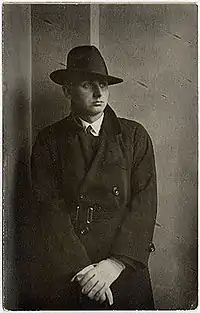Anšlavs Eglītis
Anšlavs Eglītis (October 14, 1906 – March 4, 1993) was a Latvian writer, journalist and painter who became a war refugee in 1944.[1] He had prolific career as a novelist,[1][2] and his later work often examined aspects of exile life.[3]
Anšlavs Eglītis | |
|---|---|
 | |
| Born | 14 October 1906 Rīga, Russian empire (now Latvia) |
| Died | 4 March 1993 Los Angeles, California, U.S. |
| Occupation | writer, novelist, journalist |
| Nationality | Latvian |
| Spouse | Veronika Janelsiņa |


Biography
Anšlavs Eglītis was born in Riga, Latvia, the first of two children born to his parents. His father, Viktors Eglītis, was a Latvian writer who was one of the most notable representatives of Decadence in Latvian literature.[1] During the First World War, his family lived in other parts of the Russian Empire, but returned to Latvia in 1918. For a short time they settled in Alūksne. After 1919, his family lived in Riga and Eglītis started his studies in Riga City gymnasium No. 2. He also studied painting in the studio of a Latvian painter Voldemārs Tone at this time.
The family spent all their summer holidays in Inciems cottage, which he later described in his novel Pansija pilī (1962). He caught tuberculosis in 1925. His mother, who suffered pulmonary disease, died during his stay in Leysin sanatorium.
He continued his studies in the Art Academy of Latvia and graduated in 1935. After graduation he worked as a teacher of drawing. In 1936 his first collection of novels Maestro was published. In 1938 Eglītis started to work as a journalist in the biggest Latvian newspaper Jaunākās ziņas. In 1940, he also collaborated on the magazine Atpūta.
He left Riga for Courland in October 1944 and later fled to Germany where he settled in Berlin. During the Battle of Berlin his flat was destroyed in an air raid and Eglītis moved to Switzerland. In 1950, he moved to California, USA.
His father, writer Viktors Eglītis, was arrested, tortured and killed in the Cheka building in Riga in 1945. His grave is unknown.
In his American exile, Eglītis wrote more than 50 novels and short stories. Parallel to his literature career he became a theatre and film critic for the Latvian newspaper Laiks published in Brooklyn, NY, which also serialized a number of his novels.[4][5] In 1957, his Neierasta Amerika began to be serialized in the Soviet Latvian magazine Zvaigzne, but it was immediately qualified as an 'import of bourgeois nationalism' and soon discontinued.[6]
The success of his works resides in their avangardist flavour combined with loyalty to the popular taste.[7] In post-Soviet Latvia, his Shameless Old Men directed by Mihail Kublinskis, is one of the most successful productions of the National Theater.[8]
He died of cancer in Los Angeles in 1993. In 2006, the Latvian Post issued a commemorative stamp in honor of Eglītis.[3] A monument to the writer was installed in 2008 in Inciems.[9]
Sources
References
- Aldis Purs, Andrejs Plakans (2017). Historical Dictionary of Latvia. Rowman & Littlefield. p. 102. ISBN 978-1-538-10221-3.
- Marek Payerhin (2016). Nordic, Central, and Southeastern Europe 2016-2017. Rowman & Littlefield. ISBN 978-1-475-82897-9.
- Elliott Robert Barkan (2013). Immigrants in American History: Arrival, Adaptation, and Integration. ABC-CLIO. ISBN 978-1-598-84220-3.
- Rita Laima (2017). Skylarks and Rebels: A Memoir about the Soviet Russian Occupation of Latvia, Life in a Totalitarian State, and Freedom. Columbia University Press. ISBN 978-3-838-26854-5.
- Edīte Zuzena (1981). "Maestro Anšlavs Eglītis un viņa romāni" (in Latvian). Jaunā Gaita nr. 136. Retrieved February 1, 2015.
- Romuald J. Misiunas, Rein Taagepera (1993). The Baltic States, Years of Dependence, 1940-1990. University of California Press. p. 154. ISBN 978-0-520-08227-4.
Anslavs Eglitis.
- Juris Silenieks, Carnegie-Mellon University (1982). "Between a rock and a hard place: Latvian drama today". Lituanus - Lithuanian Quarterly Journal of Arts and Sciences, Volume 28, No.3. Retrieved February 7, 2017.
- Kalina Stefanova (2014). Eastern European Theatre After the Iron Curtain. Routledge. pp. 88–89. ISBN 978-1-134-42569-3.
- "Pansija pilī ziemā" (PDF). Dienvidkalifornijas latviešu informācijas biļetens. 2008. Retrieved February 1, 2015.
| Wikimedia Commons has media related to Anšlavs Eglītis. |